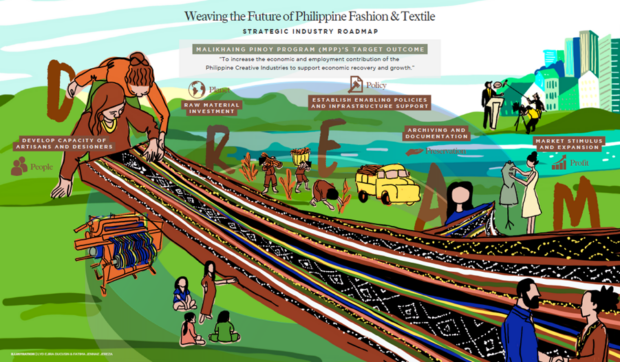
Illustration from the DTI
MANILA, Philippines — The government is working on an industry roadmap for the local fashion and textile sectors that will identify current-day challenges and opportunities, as well as set the policy direction for these industries.
The Department of Trade and Industry (DTI) on Wednesday said it conducted a validation session last Tuesday where it gathered inputs from industry leaders, experts, and stakeholders.
“The roadmap aims to evaluate the past performance and present conditions of the Philippine and global fashion and textile industries and pinpoint the impediments and obstacles hindering its advancement,” the DTI said in a statement.
The government agency added that the draft of the planned road map also highlights key strategies under its strategic pillars dubbed as D.R.E.A.M.
These include the development of the capacity of artisans and designers, raw material investments, the establishment of enabling policies and infrastructure support, archiving and documentation, and market stimulus and expansion.
READ: Garment exporters call for construction of textile mills
Trade Undersecretary Rafaelita M. Aldaba, who leads the DTI’s Competitiveness and Innovation Group, highlighted that globalization and trade liberalization have presented new challenges and opportunities for these industries.
High-value, eco-friendly textile products
“The prospects for the growth and development in the Philippines are promising because of our diverse cultural heritage, skilled labor force, and the support of government initiatives that assist local designers, develop sustainable practices, and enhance the competitiveness of Philippine textiles in the local market,” Aldaba said.
READ: Textile industry faces hurdles as rivals automate
The trade official said that there is a shift toward high-value and eco-friendly textiles, adding that the government policies and strategies are enhancing industry competitiveness, promoting innovation, and strengthening the local supply chain.
Sought for comment, Foreign Buyers Association of the Philippines (FOBAP) president Robert M. Young told the Inquirer that the roadmap seems to be focusing more on the indigenous textile business.
Young, whose trade group had exported as much as $1 billion worth of garments goods a year in the past, said there should be more attention to the mainstream commercial fast fashion given its higher revenue generation potential.
“(The) Philippine government must revive and re-develop the commercial type of fabric and textile for local commercial and export manufacturing,” he said, adding that the government can begin by establishing pilot textile mills so that the Philippines can produce its own fabrics instead of importing these goods.